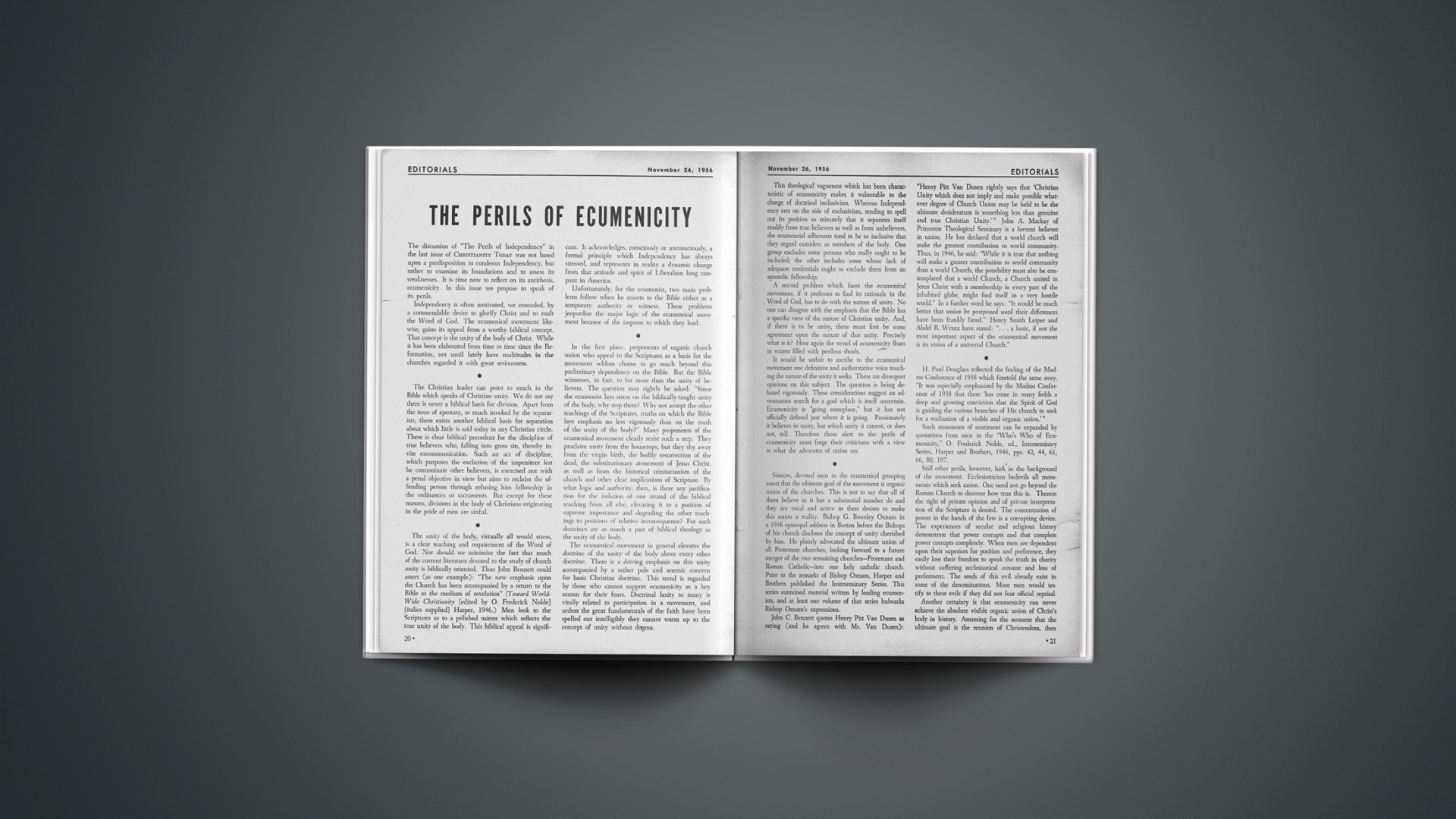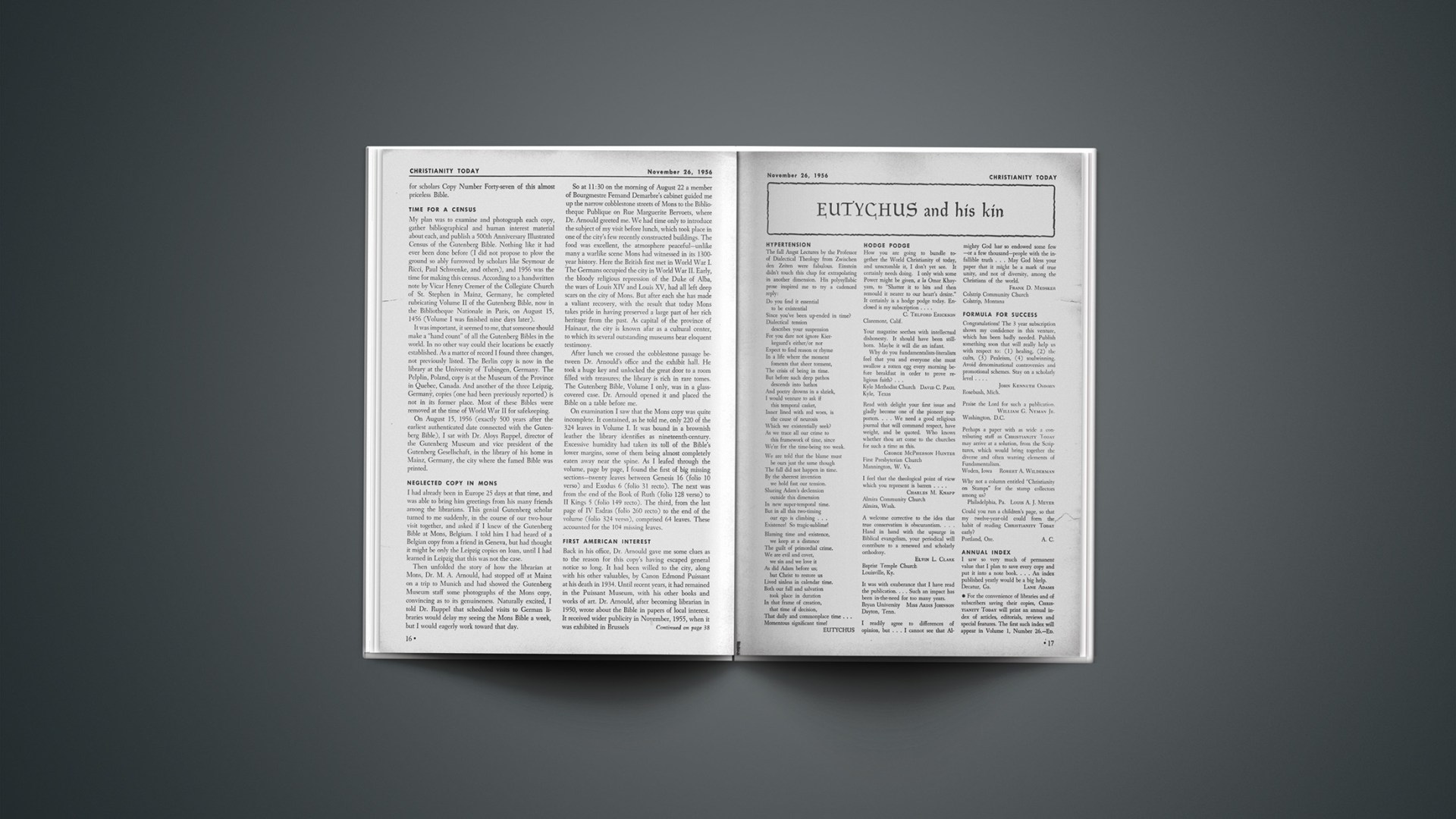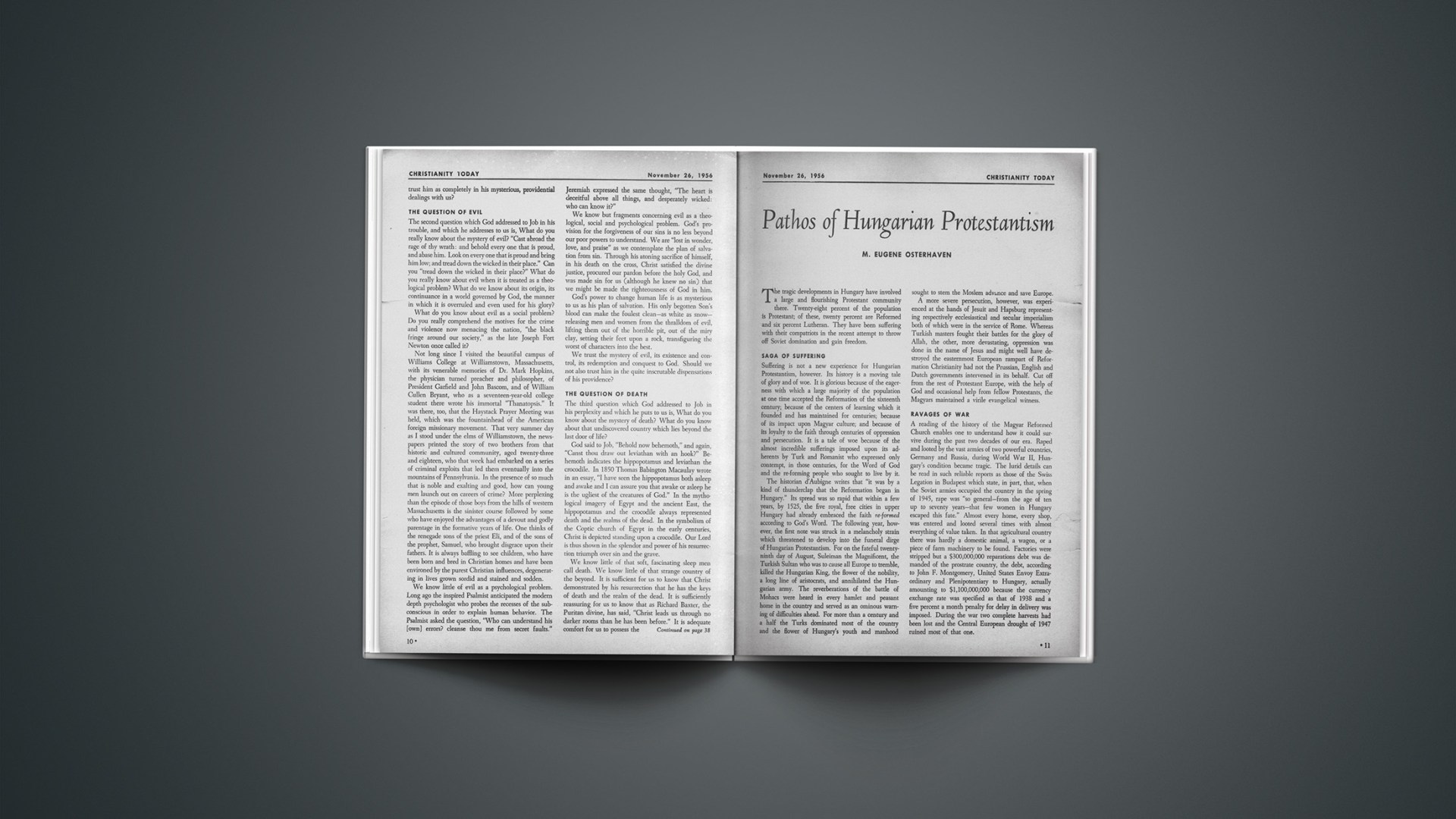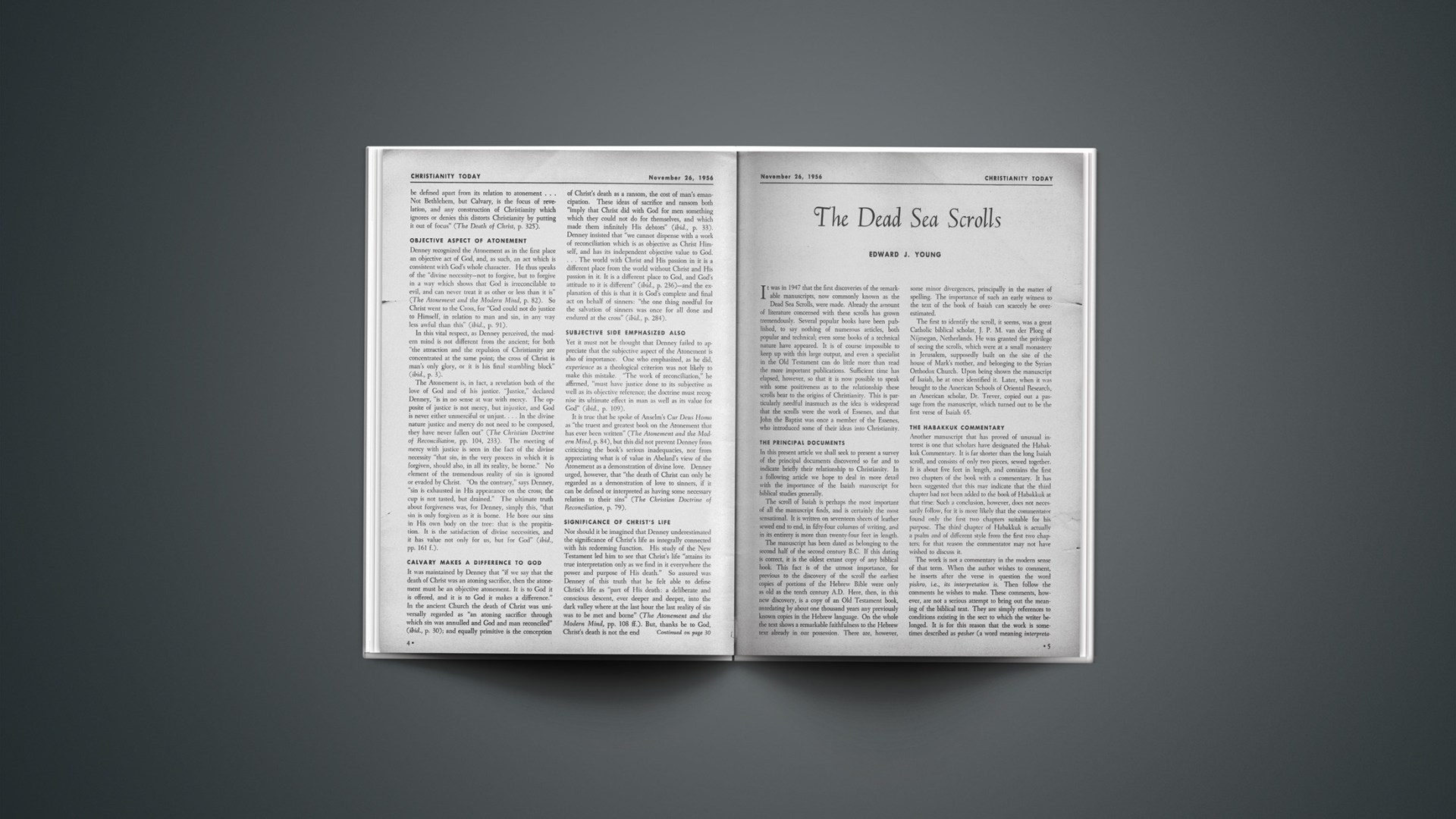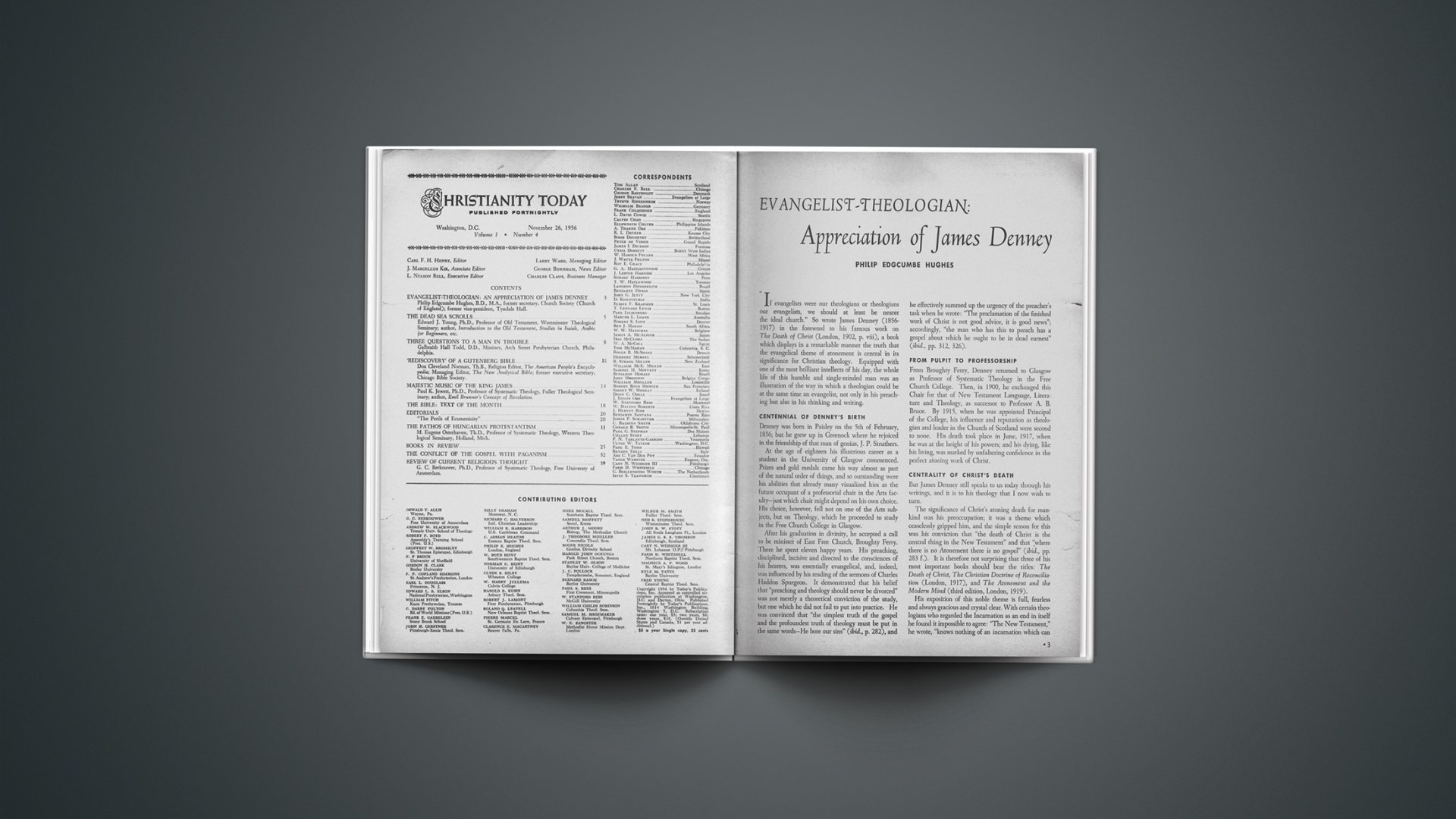The discussion of “The Perils of Independency” in the last issue of Christianity Today was not based upon a predisposition to condemn Independency, but rather to examine its foundations and to assess its weaknesses. It is time now to reflect on its antithesis, ecumenicity. In this issue we propose to speak of its perils.
Independency is often motivated, we conceded, by a commendable desire to glorify Christ and to exalt the Word of God. The ecumenical movement likewise, gains its appeal from a worthy biblical concept. That concept is the unity of the body of Christ. While it has been elaborated from time to time since the Reformation, not until lately have multitudes in the churches regarded it with great seriousness.
*
The Christian leader can point to much in the Bible which speaks of Christian unity. We do not say there is never a biblical basis for division. Apart from the issue of apostasy, so much invoked by the separatists, there exists another biblical basis for separation about which little is said today in any Christian circle. There is clear biblical precedent for the discipline of true believers who, falling into gross sin, thereby invite excommunication. Such an act of discipline, which purposes the exclusion of the impenitent lest he contaminate other believers, is exercised not with a penal objective in view but aims to reclaim the offending person through refusing him fellowship in the ordinances or sacraments. But except for these reasons, divisions in the body of Christians originating in the pride of men are sinful.
*
The unity of the body, virtually all would stress, is a clear teaching and requirement of the Word of God. Nor should we minimize the fact that much of the current literature devoted to the study of church unity is biblically oriented. Thus John Bennett could assert (as one example): “The new emphasis upon the Church has been accompanied by a return to the Bible as the medium of revelation” (Toward World-Wide Christianity [edited by O. Frederick Nolde] [italics supplied] Harper, 1946.) Men look to the Scriptures as to a polished mirror which reflects the true unity of the body. This biblical appeal is significant. It acknowledges, consciously or unconsciously, a formal principle which Independency has always stressed, and represents in reality a dynamic change from that attitude and spirit of Liberalism long rampant in America.
Unfortunately, for the ecumenist, two main problems follow when he resorts to the Bible either as a temporary authority or witness. These problems jeopardize the major logic of the ecumenical movement because of the impasse to which they lead.
*
In the first place, proponents of organic church union who appeal to the Scriptures as a basis for the movement seldom choose to go much beyond this preliminary dependency on the Bible. But the Bible witnesses, in fact, to far more than the unity of believers. The question may rightly be asked: “Since the ecumenist lays stress on the biblically-taught unity of the body, why stop there? Why not accept the other teachings of the Scriptures, truths on which the Bible lays emphasis no less vigorously than on the truth of the unity of the body?” Many proponents of the ecumenical movement clearly resist such a step. They proclaim unity from the housetops, but they shy away from the virgin birth, the bodily resurrection of the dead, the substitutionary atonement of Jesus Christ, as well as from the historical trinitarianism of the church and other clear implications of Scripture. By what logic and authority, then, is there any justification for the isolation of one strand of the biblical teaching from all else, elevating it to a position of supreme importance and degrading the other teachings to positions of relative inconsequence? For such doctrines are as much a part of biblical theology as the unity of the body.
The ecumenical movement in general elevates the doctrine of the unity of the body above every other doctrine. There is a driving emphasis on this unity accompanied by a rather pale and anemic concern for basic Christian doctrine. This trend is regarded by those who cannot support ecumenicity as a key reason for their fears. Doctrinal laxity to many is vitally related to participation in a movement, and unless the great fundamentals of the faith have been spelled out intelligibly they cannot warm up to the concept of unity without dogma.
This theological vagueness which has been characteristic of ecumenicity makes it vulnerable to the charge of doctrinal inclusivism. Whereas Independency errs on the side of exclusivism, tending to spell out its position so minutely that it separates itself readily from true believers as well as from unbelievers, the ecumencial adherents tend to be so inclusive that they regard outsiders as members of the body. One group excludes some persons who really ought to be included; the other includes some whose lack of adequate credentials ought to exclude them from an apostolic fellowship.
A second problem which faces the ecumenical movement, if it professes to find its rationale in the Word of God, has to do with the nature of unity. No one can disagree with the emphasis that the Bible has a specific view of the nature of Christian unity. And, if there is to be unity, there must first be some agreement upon the nature of that unity. Precisely what is it? Here again the vessel of ecumenicity floats in waters filled with perilous shoals.
It would be unfair to ascribe to the ecumenical movement one definitive and authoritative voice touching the nature of the unity it seeks. There are divergent opinions on this subject. The question is being debated vigorously. These considerations suggest an adventurous search for a goal which is itself uncertain. Ecumenicity is “going someplace,” but it has not officially defined just where it is going. Passionately it believes in unity, but which unity it cannot, or does not, tell. Therefore those alert to the perils of ecumenicity must forge their criticisms with a view to what the advocates of union say.
*
Sincere, devoted men in the ecumenical grouping assert that the ultimate goal of the movement is organic union of the churches. This is not to say that all of them believe in it but a substantial number do and they are vocal and active in their desires to make this union a reality. Bishop G. Bromley Oxnam in a 1948 episcopal address in Boston before the Bishops of his church discloses the concept of unity cherished by him. He plainly advocated the ultimate union of all Protestant churches, looking forward to a future merger of the two remaining churches—Protestant and Roman Catholic—into one holy catholic church. Prior to the remarks of Bishop Oxnam, Harper and Brothers published the Interseminary Series. This series contained material written by leading ecumenists, and at least one volume of that series bulwarks Bishop Oxnam’s expressions.
John C. Bennett quotes Henry Pitt Van Dusen as saying (and he agrees with Mr. Van Dusen): “Henry Pitt Van Dusen rightly says that ‘Christian Unity which does not imply and make possible whatever degree of Church Union may be held to be the ultimate desideratum is something less than genuine and true Christian Unity.’ ” John A. Mackay of Princeton Theological Seminary is a fervent believer in union. He has declared that a world church will make the greatest contribution to world community. Thus, in 1946, he said: “While it is true that nothing will make a greater contribution to world community than a world Church, the possibility must also be contemplated that a world Church, a Church united in Jesus Christ with a membership in every part of the inhabited globe, might find itself in a very hostile world.” In a further word he says: “It would be much better that union be postponed until their differences have been frankly faced.” Henry Smith Leiper and Abdel R. Wentz have stated: “… a basic, if not the most important aspect of the ecumenical movement is its vision of a universal Church.”
*
H. Paul Douglass reflected the feeling of the Madras Conference of 1938 which foretold the same story. “It was especially emphasized by the Madras Conference of 1938 that there ‘has come in many fields a deep and growing conviction that the Spirit of God is guiding the various branches of His church to seek for a realization of a visible and organic union.’ ”
Such statements of sentiment can be expanded by quotations from men in the “Who’s Who of Ecumenicity,” O. Frederick Nolde, ed., Interseminary Series, Harper and Brothers, 1946, pps. 42, 44, 61, 66, 80, 197.
Still other perils, however, lurk in the background of the movement. Ecclesiasticism bedevils all movements which seek union. One need not go beyond the Roman Church to discover how true this is. Therein the right of private opinion and of private interpretation of the Scripture is denied. The concentration of power in the hands of the few is a corrupting device. The experiences of secular and religious history demonstrate that power corrupts and that complete power corrupts completely. When men are dependent upon their superiors for position and preference, they easily lose their freedom to speak the truth in charity without suffering ecclesiastical censure and loss of preferment. The seeds of this evil already exist in some of the denominations. More men would testify to these evils if they did not fear official reprisal.
Another certainty is that ecumenicity can never achieve the absolute visible organic union of Christ’s body in history. Assuming for the moment that the ultimate goal is the reunion of Christendom, then the ecumenical movement itself contains seeds of divisiveness as does Independency. There will always be those who will insist that unity is spiritual, and not visible nor organizational, and that true unity has in it a transcendental element in view of the communion of saints. Never will it be possible to bring together all these diverse elements which make up the true body of Christ. As long as so much as one segment of the body is excluded in history, absolute unity does not exist. It has never fully existed in history, although the Roman and Greek Churches before the Great Schism provide the fullest approximation in history. Any goal of absolute unity is ephemeral and chimerical; at best, visible unity can never be more than partial.
Ecumenicity tends to be just as intolerant as Independency, although this intolerance is expressed in a somewhat different fashion. Whereas Independency draws narrow lines, defining beliefs in such a detailed and technical fashion that it rules out many, ecumenicity also draws lines which are narrow and intolerant. It has little use or respect for those with whom it differs, easily regarding as fanatical and divisive those who refuse to cooperate within its orbit of inclusivism. It will tolerate and welcome those who will submit to its inclusivistic theology, but will try ruthlessly to crush and eliminate the opposition by ecclesiastical devices.
One of the tragic weaknesses of Independency is that it majors on minors. And ecumenicity does not entirely escape this same peril. It reverses the process, however. It minors on majors, exalting to a place of primacy what is not important, relegating to a secondary position that which is basic and necessary to a full-orbed Gospel. Both attitudes are essentially heretical. While they are opposite in polarity, they both rise from a departure from the apostolic base. One narrowly excludes divergence of opinion, so that it becomes difficult for some undoubted Christians to find standing room. The other is so broad and so indefinite that one cannot be sure on what ground he stands. Neither one is truly biblical nor finally acceptable. The narrow obscurantism of Independency is more widely known and challenged. The broad vistas of ecumenicity, indefinite and elusive, are less generally recognized as participating in the same spirit which characterizes those who major on minors. But the one is no less a peril than the other.
The discussion here does not concern the question of “elements of good” in ecumenicity or in independency. Rather, the purpose is to speak about the perils which beset both. This much is clear: neither movement is entirely in error. But neither possesses the sum total of truth. Neither movement possesses the ingredients of a permanent and suitable solution to the problems which vex the Church of Christ in history. The end of one is an unrestrained individualism: every man his own master, priest and congregation. The end of the other makes one man the master of all; its ultimate form is the pope of Rome, or another pope like him. The fact that both movements head in these directions does not mean that the end is inevitable. But it does suggest that, unless substantial changes are made to redirect the movements, this sad outcome remains a live possibility.
These observations are made neither in a spirit of criticism nor of condemnation. They follow rather from an earnest attempt to see the patterns in history, and from them to anticipate, however dimly, the shape of things to come. Silence has little influence; a word in season, spoken in an irenic spirit, may give pause for reflection and revision.
***
Does Jesus Repudiate the God of Mt. Sinai?
For several decades Liberalism has impressed upon the mind of the Church the notion that the God revealed by the prophets has little affinity with the God revealed by Christ. This strange concept still prevails in the thought life of the Church even though liberal theology is on the decline. Frequently “the thunderous war God of Sinai, demanding an eye for an eye” and “the merciful heavenly Father of Jesus Christ” are contrasted to each other.
That the God of Old Testament revelation differs in nature from the God revealed by Jesus is often vindicated—at least, so it is thought—by an appeal to the Sermon on the Mount: “Ye have heard that it hath been said, an eye for an eye, and a tooth for a tooth: but I say unto you, that ye resist not evil: but whosoever shall smite thee on thy right cheek, turn to him the other also.” The God of Sinai established the principle of an eye for an eye. It would seem that Jesus rejects that dictum as unmerciful and ipso facto rejects the God who laid down such a principle.
Only a cursory reading of the passages involved in the Old and the New Testaments would give substance to this viewpoint. Jesus deals with a false application of the Old Testament principle. The Pharisees and scribes applied the text for the purpose of personal revenge, whereas the God of Sinai revealed the principle as a rule for the administration of justice. A guide for magistrates was misapplied as a regulation for private life.
The rule “an eye for an eye” appears first in Exodus 21, which is headed by the statement: “Now these are the judgments.” The word judgment in Hebrew signifies legal decision. Deuteronomy 19:18, 21 announces the precept as a guide for judges. Leviticus 24:19 also declares the regulation to be a law. To this day it is considered an elementary principle of sound jurisprudence that the punishment should fit the crime. If the God of Sinai be despised for promulgating this principle, modern day judges should also be condemned for measuring justice by this norm.
Jesus did, indeed, reveal God as merciful. But He did not thrust into the background the justice and holiness of God. In the Sermon on the Mount, Jesus said, “For if ye forgive not men their trespasses, neither will your Father forgive your trespasses.” An unforgiving “eye” on the part of man would receive an unforgiving “eye” from God. Further in the Sermon on the Mount Jesus declares, “with what measure ye mete, it shall be measured to you again.” These statements concern judgments and are no different from the pronouncements in the Old Testament.
Thus Jesus in the Sermon on the Mount reveals God also as demanding an eye for an eye as a principle of justice. The God whom Jesus disclosed is no different from the God of Sinai. Only a superficial interpreter of the Word would make an unsubstantiated contrast between “the thunderous war God of Sinai” and “the merciful heavenly Father of Jesus Christ.” This false concept must be effectively challenged and combatted. Neither Christianity nor the province of ethics is bound by attempts to magnify mercy that ignore or depreciate the claims of justice. Correctives must be vigorously employed to counteract erroneous concepts active in the theology of the church today.
What Is the Way to a New Society?
To thoughtful and conscientious Christians there comes the recurring problem of one’s Christian faith and the social application of this faith. None of us lives in a vacuum and each of us exerts an influence in these matters, either for righteousness or against. Neutrality is an impossibility.
The issue on which the greatest debate centers is how shall the Christian and the Church exercise influence for righteousness in the social order?
The easiest way is to permit the Church to speak through her agencies and leadership and, as the Church, to exert moral pressures in the areas of public opinion, legislative halls and enforcement agencies.
The hardest way is for the individual Christian, as a Christian citizen, to make his position known through his personal life, his publicly and privately expressed opinion and his vote.
There are many who will insist that both methods are necessary and legitimate.
To arrive at a satisfactory philosophy several questions must be asked. What is the primary task of the Church? What is the position of the Christian in the world? What is it that distinguishes both the Church and the Christian from the society in which they find themselves?
The primary task of the Church. One has but to take any Saturday edition of a metropolitan newspaper and read the topics for the one sermon to be preached in the majority of the larger churches the next day to see that for many the primary task of the Church is either a forgotten or a never-grasped truth. Instead of soul-searching messages based on a scriptural grasp of the Gospel of God’s transforming and redeeming power, there are homilies on any number of trivial problems the solution of which, one way or the other, has no eternal significance.
No greater tragedy exists in contemporary religious life than the fact that from thousands of American pulpits today there comes the faint peep of a tin horn rather than the clear blast of a trumpet sounding the call of the living God to a people who are bowing at the altars of a thousand modern Baals and who need to hear of righteousness and of judgment and of wrath to come.
But some will argue that proclaiming the social demands of a righteous God is the prophetic preaching so much needed today. Is not social unrighteousness on every hand? Is not the inhumanity of man to man, so much in evidence at home and abroad, justification for the plea of brotherly love? Must not the Church proclaim social justice?
The answer to these and other questions should be obvious. How can a new social order be built without new men? How shall there be new men unless they are born again? How shall they be born again until they come to a personal and saving relationship with the Lord Jesus Christ? How shall they come to such a relationship unless they hear the Gospel?
In our desire for social righteousness, by a rectification of the corporate sins of a corporate society we are forgetting that there is no such thing as corporate salvation other than in and through personal, individual salvation.
The primary task of the Church is therefore to win individuals to Christ. It is a spiritual mission, a mission not only alien to but completely obscure and meaningless to the unregenerate world in which it works.
What is the position of the Christian in the world? Although the formula is denied by some and considered trite by others, the fact remains that the Christian is “in but not of” this world. The moment he becomes a Christian he has transferred his citizenship from a dying and lost society to a heavenly fellowship which is eternal.
Does this mean that he no longer has a responsibility in this world? Just the opposite. For the first time, he has a responsibility, and it is a tremendous one. According to our Lord’s own statement, the Christian has now become “salt”; he has become “light”; he has become a “witness”; he has become a living man walking among those who are dead; he is no longer walking in darkness but in light.
Because of this transformation the Christian is the key to the improvement of society. By his personal life, by his private and public utterances, by his influence in every area of daily contact it is his duty to live for his Lord and in so doing to lead men to glorify the God whom he serves.
What distinguishes the Church and the Christian from the society in which they find themselves? The answer is this: the Church and the Christian are a spiritual force in the world. To substitute political and other factors for this spiritual force is to exchange the seamless robe of the Lord of Glory for the toga of a modern Caesar.
This does not for one minute imply that the Christion abdicates as a citizen. But it does mean that he recognizes that the transformation which has taken place in his own life is the same transformation his fellow men, individually and corporately, must also undergo if they are to live to the glory of God and for the good of their brothers.
At the same time when the Church, in the name of the Church, enters the secular arena and exerts political pressures for righteousness in the social order, then the Church is prostituting her mission and adding to the confusion of the world.
There are thinking and earnest Christians who will not accept the above. They honestly believe that the Church, as such, must exert political pressures for social righteousness.
Let us honestly try to face this problem. Let us take certain specific sins; slavery, alcoholism, lust, greed, prejudice, hate, to mention only a few. All of these have widespread social implications.
What happens when slavery is abolished? when there is no intemperance? when purity of life supplants licentiousness? when the material welfare of others take precedence over personal gain? when all race prejudice is eliminated and every evidence of this prejudice disappears from the horizon? when love reigns and hatreds are no more?
The obvious answer is that then we will have heaven here on earth. But a question immediately follows: How can such things be?
The final answer throws us back on the Bible and the Christ of the Bible and the Gospel He came to make possible. The solution of the spiritual and moral and social problems of the world is to be found in the redeeming and transforming work of the Son of God, the Lord Jesus Christ. This solution is found in that which Christ has done for individual souls; and that solution is called the Gospel.
Christian Responsibility and Communist Brutality
Events of the last few weeks are causing many Christians to experience an “agonizing reappraisal” of their concept of world order. How are the demands of an enlightened Christian conscience to be met when confronted by the situation in Hungary? When men are dying in their desire for freedom; when God-given aspirations for self determination are being brutally crushed; when a reign of terror of unexceeded rigor is being perpetrated even as these lines are written, what should be the reaction of Christians who are living in freedom and peace?
Is the Christian approach to expend itself in resolutions of disapproval? Is a renewed statement of the principles of Christian freedom and human justice a sufficient answer to the wilful destruction of a nation?
A relatively small number of trucks carrying Red Cross supplies does not solve the problem, although it is a part of our responsibility and can and will be amplified as opportunity presents itself. Nor will expressions of sympathy mean much unless sympathy is implemented by action.
The philosophy: “Anything short of war,” can do irreparable harm, for it gives the aggressor a sense of security which itself begets aggression. We believe just such a situation has developed.
The rape of Hungary may be the desperate act of a tottering regime which was born in terror and which has continued to exist in the same manner. But America and other free nations share the blame insofar as they have sustained that regime by recognition and given it a forum of respectability in which to operate.
A slap on the wrist is not the answer to what Russia has done in Hungary. Expulsion from the United Nations, with its accompanying disintegrating effect on world Communism, is the least Christians should demand in way of punishment.
Which shall take precedence—the preservation of an organization, or the certifying of a moral principle?

